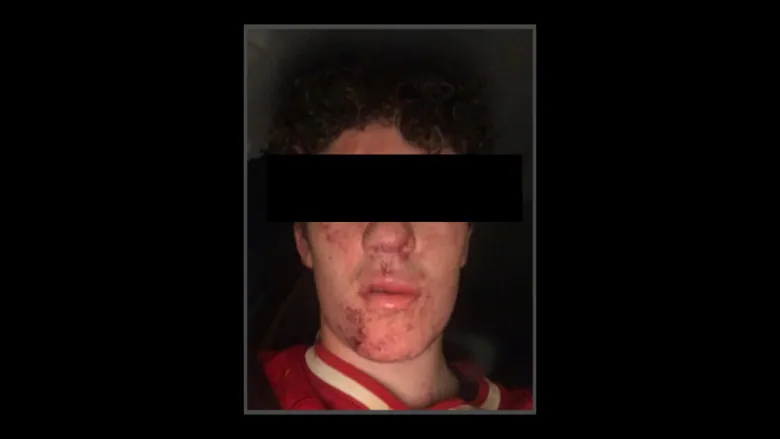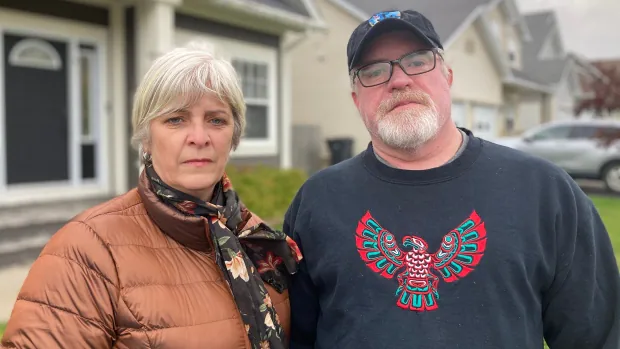The parents of a Mount Pearl teenager are wondering where to turn after an alleged violent assault on their son by his high school classmates left him feeling unsafe and unprotected on school grounds.
The former O’Donel High student says he was brutally attacked by six boys during a New Year’s Eve party last year, assaulted so severely that police later said it endangered his life, according to his parents.
Those six boys followed him to a wooded area, surrounded him and beat him until he was unrecognizable, said Glenn Sullivan, the boy’s father, speaking to CBC News from the driveway of his Mount Pearl home.
After the alleged attack, “he didn’t come out of his room for about three weeks,” Sullivan said, describing how multiple kicks to the head left his son with a severe concussion and bloodied eye.
“His face was all misshapen, and he couldn’t hear out of his ear for about a month,” Sullivan said.
The boy’s mother, Jana Sullivan, picked her son up that night, telling CBC News he was “covered head to toe” in blood, with cauliflowered ears, a swollen nose and two black eyes. Her son says the boys beat him unconscious and threw his phone into a nearby stand of trees. He woke up to the sound of his phone ringing, she said.

The school’s principal at first reassured the Sullivans their son would return safely to class after he recovered. But as the months wore on, the family says, administration did little to ensure their child could spend his days at school without encountering his alleged attackers.
That, too, affected their son, whose first name CBC News has agreed to withhold for his mental well-being.
The six boys have been charged as minors with aggravated assault, and can’t legally be identified. The allegations against them have not been proven in court.
The alleged attack happened outside school hours, prompting the school to tell the Sullivans its hands were tied in terms of providing discipline or remediation, the family said.
The accused boys continued to harass and antagonize the Sullivans’ son, according to his mother, until five of them graduated in June.
The Newfoundland and Labrador English School District would not speak to CBC News about this case, citing privacy concerns. In an emailed statement, a spokesperson said the board enacts a “safe plan” when a student is deemed a threat to others, which may include supervision.
But CEO Tony Stack also declined to speak on the general topic of school violence, refusing several interview requests.
‘It’s just a joke’
One of the accused is still a student at the school, the Sullivans note. He’s accompanied to and from classes, but on his lunch break, he’s free to roam — leaving the Sullivans’ daughter, a Grade 10 student at O’Donel, vulnerable to what the family is calling intimidation and harassment.
The family asked for that student to be relocated, but say the school declined their request. So their son, 17 and now in Grade 12, moved briefly to Nova Scotia earlier this year to complete his education — the result of what Glenn describes as lip service from the school administration.
“They’re just like, ‘We’re sorry, we understand your frustration.’ And that’s all you get. Other than that, there’s nothing else,” he said. “It’s just a joke.”
They point to a photo taken of three of the accused teens at a graduation party, posing with the principal.
Seeing that, they said, was the final straw for the Sullivans’ son.

“This is not something he’s going to get over quickly. This is going to take time,” said Jana, fighting back tears. “But just to know he didn’t have to face the person that did this to him should account for a healthy mental [environment].”
“Just mentally, knowing everybody knew who did it and how it happened and when it happened,” Glenn said. “You have someone almost beat you to death, and then you have to walk down the hall with them every day after that?
“He felt safer going to another province.”
Inaction sends message that ‘violence is acceptable’: advocate
The Safe and Caring Schools Policy, a 2013 government document on school violence and bullying, says schools have a responsibility to address violence when it has a “negative effect on the teaching and learning environment of the school,” regardless of where or when it occurred.
Susan Rose, a human rights advocate who has worked in the field of school violence prevention for years, says the Sullivans’ experience highlights a broader problem with the system.
“If you look at the map of Newfoundland and Labrador — 250 schools — we’ve got issues in over half,” she said, describing a “broken” system in which leaders aren’t accountable for sending a team of workers to schools needing help dealing with violence.
The Education Department, in a statement to CBC News, said schools are “prepared to appropriately deal with serious incidents of harm,” but said it encourages restorative, rather than punitive, measures to deal with violence.
“Suspension or moving a student to another school community does not address the underlying issues of school violence,” a spokesperson wrote. “Suspension may be used to keep a student out of school while a plan is being put in place for a successful re-entry, while respecting the needs, safety and dignity of all involved, but it is not the long-term solution to these issues.”
The school board’s silence is no surprise to Rose.
“When you have students that are engaging in this type of activity outside of the school community, and they go back to school and that’s ignored, there’s only one message communicated to every kid in that school: violence is acceptable,” she said.
“That’s the message I’m very sad to say is alive and well in some of our schools.”
Read more from CBC Newfoundland and Labrador


